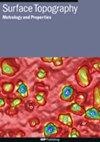Exact surface measurement based on phase error insensitive method for white-light scanning interferometer
IF 2
3区 材料科学
Q2 ENGINEERING, MECHANICAL
引用次数: 0
Abstract
Phase error induced by the scanning error of piezoelectric transducer and vibration in white-light interference signal (WLIS) impose limitations on measurement accuracy. In this paper, two techniques are investigated to eliminate phase error cooperatively. A monochromatic interferometer owning the same optical path as the white-light scanning interferometer (WLSI) is employed to detect and compensate the phase error. Due to the incomplete consistency between the detected phase error and its actual distribution, an algorithm is introduced to further enhance the measurement accuracy. The simulation is given to prove the proposed method is available in different magnitude of noise. In the experiment, the front surface of wedged window is measured, whose maximum fluctuations are reduced to 28.8 nm and 3.0 nm from 62.7 nm with the gradual application of two technologies, and the repeatability reach 5.0 nm and 0.4 nm from 16.8 nm, respectively. The root mean square height基于白光扫描干涉仪相位误差不敏感方法的精确表面测量
压电传感器的扫描误差和白光干扰信号(WLIS)中的振动引起的相位误差对测量精度造成了限制。本文研究了两种协同消除相位误差的技术。采用与白光扫描干涉仪(WLSI)光路相同的单色干涉仪来检测和补偿相位误差。由于检测到的相位误差与其实际分布不完全一致,因此引入了一种算法来进一步提高测量精度。仿真证明了所提出的方法适用于不同量级的噪声。在实验中,测量了楔形窗口的前表面,随着两种技术的逐步应用,其最大波动分别从 62.7 nm 降至 28.8 nm 和 3.0 nm,重复性分别从 16.8 nm 降至 5.0 nm 和 0.4 nm。均方根高度 Sq 和最大高度 Sz 最终降至 1.3 nm 和 1.6 nm。消除相位误差后,对高度约为 3.0 μm 的台阶的测量也具有良好的精度和重复性。由于被测表面在光源波长范围内的反射率不同,也会带来测量误差,因此对其影响因素进行了模拟分析。所提出的技术为 WLSI 提供了一种对相位误差不敏感的方法,具有在复杂环境中进行测量的潜力。
本文章由计算机程序翻译,如有差异,请以英文原文为准。
求助全文
约1分钟内获得全文
求助全文
来源期刊

Surface Topography: Metrology and Properties
Materials Science-Materials Chemistry
CiteScore
4.10
自引率
22.20%
发文量
183
期刊介绍:
An international forum for academics, industrialists and engineers to publish the latest research in surface topography measurement and characterisation, instrumentation development and the properties of surfaces.
 求助内容:
求助内容: 应助结果提醒方式:
应助结果提醒方式:


